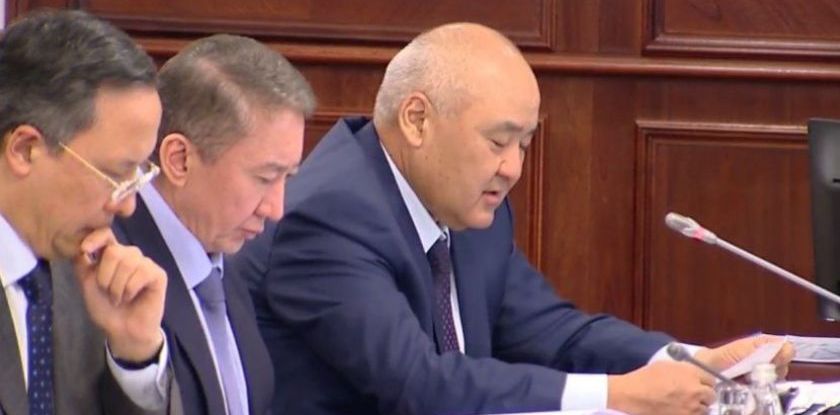Judging by the results of the monitoring of the Kazakhstan ministries’ activity in January 2018, Umirzak Shukeyev and his agency have become the unquestionable leaders in the country. And this is not at all surprising since Shukeyev, having rolled up his sleeves, has made it his mission to rescue the grain-crop sub-sector and also started to actively visit the regions.
Thus, this confirms our idea that his appointment as Vice Prime Minister and, simultaneously, as the Minister of Agriculture was dictated not so much by Nursultan Nazarbayev’s decision to give a job to Akhmetzhan Esimov as by the scale, the depth, and the complexity of the problems in the agricultural sector.
Consider, with all the numerous affiliated companies, the multi-layer system, and the complexity of the group’s structure, the management of Samruk-Kazyna, nonetheless, had at their disposal albeit not always direct but still effective enough instruments to deal with each problem. As for the Ministry of Agriculture, even considering that it has twice and even three times as many business-units than the Sanruk-Kazyna National Fund (counting the farm households and individual producers), it has no instruments to influence them directly. One can only count the state subsidies but those will only reach 3% of the market participants at best.
Besides, it has many more influential people of different levels with whom Umirzak Shukeyev will have to deal if he dares to start the crucial reforms.
And there is no doubt that the need for the reforms has ripen and even overripen. To prove it, let us formulate the tasks that are topical for today and will have to be solved by the new Vice Prime Minister/the Minister of Agriculture in the nearest future:
- the cardinal renewal of the agricultural equipment fleet;
- solving the problem of the grain companies’ loan debt to the banks, first of all, the “giants” – Ivolga-Holding and KazEzportAstyk;
- the sustainable growth of the commercial wheat quality;
- decreasing the dependency of the agricultural crop productivity on the climate fluctuations and the weather conditions;
- solving the problem of the wheat overproduction including decreasing the size of its planting acreage, increasing the processing, finding new market outlets;
- giving the cattle-breeding subsector the industrial foundation;
- attracting large investments in the sector;
- solving the problem of increasing the market effectiveness of the small and individual businesses;
- providing effective employment in the rural areas;
- preventing the dramatic price growing for the agricultural products supplied to the domestic market;
- ensuring the competitiveness of the agricultural products within the EEU framework;
- increasing the quality of the agricultural products and making them meet the international or at least the regional standards.
This list compiled on the basis of studying the Kazakhstan press is of the arbitrary nature and not at all comprehensive. But even as it is, the list is quite impressive. Especially if one is to consider the fact that many problems have been existing since the Soviet times and have been tried to be solved numerous times albeit without much success.
In our opinion, the list should contain several other important points. For instance, to attract investors seriously and for the long haul, they must get rid of all kinds of bans and limitations on selling farmlands as private property, among others, to foreign citizens and companies as well as on its market trading. Without this, it is futile to count on the flow of big money to the agricultural sector of Kazakhstan.
It is also necessary to involve the large mass of the unused and non-producing farmlands in the industry. To do so, at a minimum, they must make the property and rental rights database generally accessible and introduce the progressive taxation which is likely to cause a violent resistance from the “landlords” (as a rule, top-rank officials and (or) their relatives including Bolat Nazarbayev and the other close relatives of the “Leader of the Nation”).
It is necessary to create or borrow and then adapt to the Kazakhstan conditions the new technologies of the agricultural production that will allow to produce the goods that can compete at least within the EEU framework in their quality, packaging, and price.
Considering that the level of the country’s participation in the world economy is rather high and the membership in the EEU and WTO prevents Akorda from conducting the openly protectionist policies, the task of the dramatic reforms in the agricultural sector is significantly complicated by the fact that the local producers have too many competitors whose production is better in many ways. Besides, importing it to the country is much simpler and cheaper than setting up the production in Kazakhstan.
Therefore, we have no doubt that Umirzak Shukeyev as Vice Prime Minister/the Minister of Agriculture is unlikely to meet Nazarbayev’s expectations. But there is still the question of what he will achieve in this capacity and how long he will hold on to his post.
At the same time, one may predict that the current state program of the agricultural sector development for the years 2017-2021 is likely to be reviewed. The system of subsidizing the agricultural producers and goods will be reorganized. The small agricultural business cooperation program will be reviewed or perhaps even canceled because of its economic senselessness. At the same time, the course on increasing the planting of the non-grain crops will be continued.
As for the top-management of the Ministry of Agriculture, it has already been renewed and now Umirzak Shukeyev will have to shuffle the apparatus which is a much more difficult task due to the acute deficit of the professionals who are ready to work hard for the benefit of their country on a relatively small salary.




